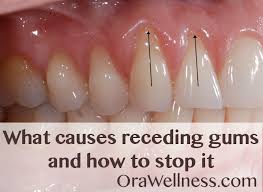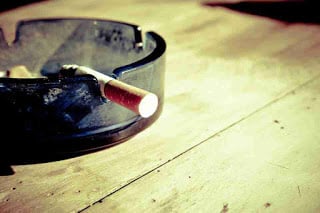Gums are made up of muscle tissues that provide seals around the teeth. They provide an effective barrier that protects the roots of the teeth. Gum recession exposes the roots of the teeth which consist of a soft tissue called cementum. Unfortunately, this tissue is easily worn away and does not replenish itself.
If the cementum or root of the tooth is exposed, cavities can form and teeth can become more sensitive. This exposure also puts the mouth and teeth at risk of other infections and oral diseases.
What Is Gum Recession?
Gingival recession, or gum recession, is what happens when gum tissue is recessed and lowers its position on the tooth, exposing the roots of the teeth. This can be caused by any number of life habits, and your course of treatment is often dependent on the cause of the problem.

What Causes Gum Recession?
Gum recession can be caused by a number of things. It can be as simple as brushing too hard or using a toothbrush that does not have soft enough bristles, but often it is a combination of things such as these:
- Poor Bite: Malocclusion or “a poor bite” is when the teeth do not align and meet properly when the mouth is closed. This poor alignment allows teeth to hit one another causing trauma to the teeth, jaw joint, gums and other mouth tissues. Repeated trauma like this will eventually cause the gums to recede.
- Grinding & Clenching Teeth or bruxism: Grinding and clenching your teeth is another way that trauma occurs in the mouth. Clenching puts excess pressure on the teeth and jaw force the gums away from the natural gum line, causing them to recede. This trauma is exacerbated when clenching and grinding are done together. Do you often wake up with a headache? Does your spouse or partner complain that you grind your teeth? This Bad oral habit can be the cause of many dental maladies, not just gum recession, so let your dentist know right away if you think you are grinding your teeth. Teeth grinding can be treated easily and painlessly with a mouth guard and several other options
- Bacteria: Bacteria in the mouth can cause infections, cavities, gingivitis and periodontal diseases all of which can cause the gums to recede. The plaque that is left behind on our teeth and below the gum line can cause tooth decay and inflammation of the tissues inside the mouth.
- Tissue Irregularities: Inside the mouth, there is a small band of tissue that connects the gum tissues to the lip and cheek tissues. This band is called a frenum. When these tissues are tight or lying lower than normal inside the mouth, it puts additional stress on the gums. Any additional pressure on the gums will cause the gums to recede.
- Overly aggressive brushing or flossing. It's great to be enthusiastic about oral care, but according to an article in the Journal of Periodontology Online, you should make sure that you're brushing, no scrubbing! Never use a toothbrush that isn't labeled "soft." Be gentle on your teeth, and remember that taking care of them isn't supposed to hurt.
- Genetics. Your gums' characteristics are determined by your genetics, just as the rest of your body is. If one or both of your parents have gum recession, you're at a higher risk for receding gums.
- Abnormal tooth positioning. If your teeth are not in alignment to one another, gum recession can occur in this situation.
- Trauma to gum tissue. The gum tissue may recede when a traumatic injury has occurred on a tooth or teeth.
- Poor oral health. If your oral health habits are questionable, gum recession may be a result of periodontitis.
Don't worry. No matter what caused your gum recession, there is a treatment.
Treatment & Prevention OF GUM RECESSION:
A visit to your dentist will help give you a personalized plan to help prevent gum recession and/or treat any roots that are already exposed. A few of the treatment options and ways to prevent further damage are:
- Flossing: Flossing regularly can help remove excess plaque from beneath the gum line preventing bacterial infection, gingivitis, and periodontal diseases.
- Proper Brushing: Ensure you are using a soft-bristled toothbrush and are not brushing too hard. If the bristles of your toothbrush are too hard or you are applying too much pressure, this can cause infections and eventual gum recession.
Here is The item That Can Help You Grow Back Receding Gums
- Christopher's Original Formulas Herbal Tooth and Gum Powder
- Gum Recession Rescue Tooth Powder - Helps Remove Plaque, Bleeding Gums & Gum Sensitivity, Helps Inflammation, Prevent Cavities, Receding Gums and Planus Lichens
- Panasonic cordless dental water Flosser, and Oral Irrigator.
- Electric toothbrush for gum. (Oral-B Gum and Sensitive Care Rechargeable Electric Toothbrush)
- TheraBreath 24 Hour Healthy Gums Periodontist Formulated Oral Rinse
What Type of Surgery Is Used to Treat Gum Recession?
The following surgical procedures are used to treat gum recession:
open flap scaling and root planing: During this procedure, the dentist or periodontist (gum doctor) folds back the affected gum tissue, removes the harmful bacteria from the pockets, and then snugly secures the gum tissue in place over the tooth root, thus eliminating the pockets or reducing their size.
Regeneration: If the bone supporting your teeth has been destroyed as a result of gum recession, a procedure to regenerate lost bone and tissue may be recommended. As in pocket depth reduction, your dentist will fold back the gum tissue and remove the bacteria. A regenerative material, such as a membrane, graft tissue, or tissue-stimulating protein, will then be applied to encourage your body to naturally regenerate bone and tissue in that area. After the regenerative material is put in place, the gum tissue is secured over the root of the tooth or teeth.
REFERENCES
- Journal of Periodontology Online
- rundledental/








